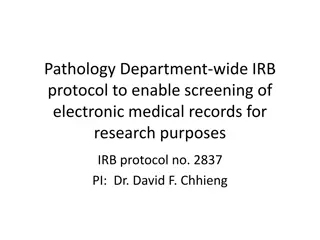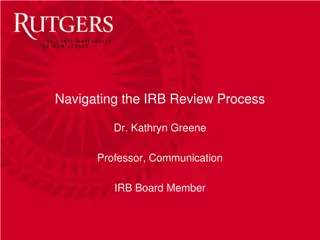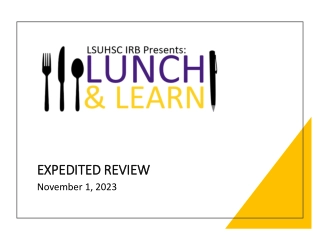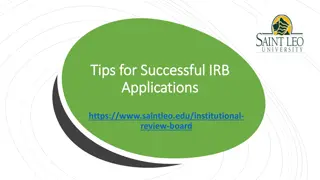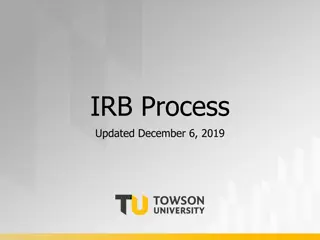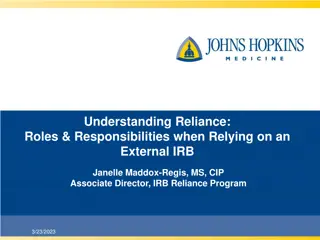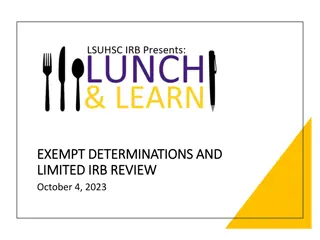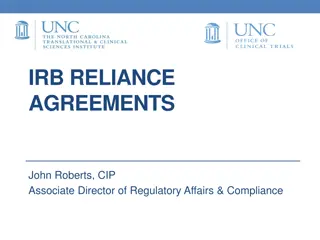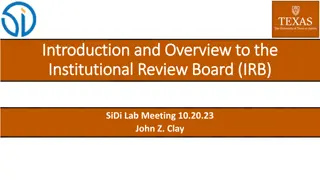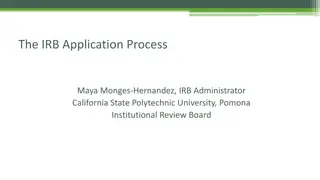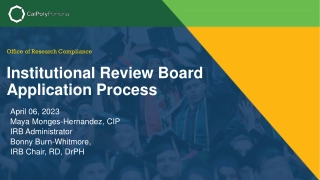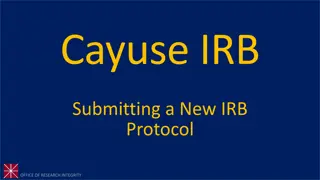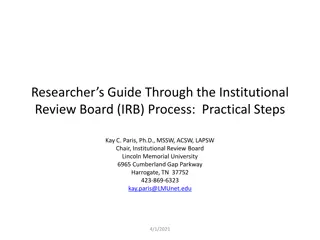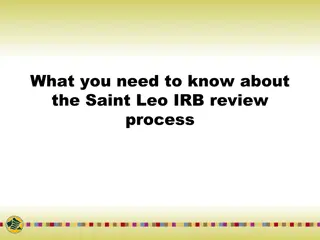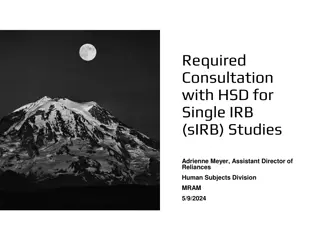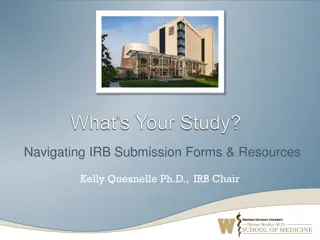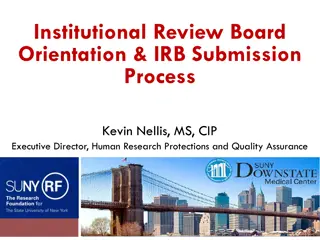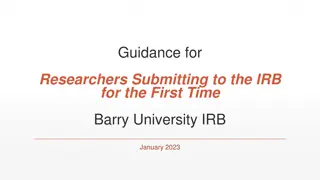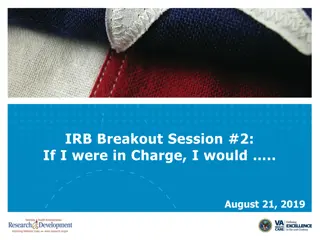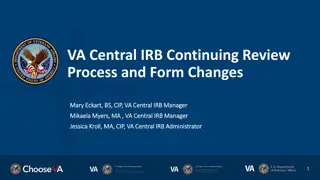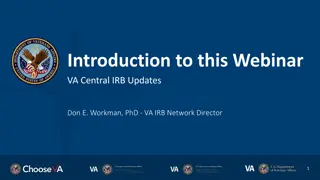Understanding the IRB Application Process Overview
This comprehensive overview delves into the IRB application process, covering topics such as human research protections, IRB oversight requirements, different types of reviews, informed consent, response to IRB correspondence, common errors, and the significance of ethics in research. Key historical events like the Nuremberg Code, Tuskegee Study, and contemporary cases emphasize the importance of ethical considerations in human subjects research. The Belmont Report principles and legal requirements from OHRP and FDA for human research protections are also discussed.
Download Presentation

Please find below an Image/Link to download the presentation.
The content on the website is provided AS IS for your information and personal use only. It may not be sold, licensed, or shared on other websites without obtaining consent from the author. Download presentation by click this link. If you encounter any issues during the download, it is possible that the publisher has removed the file from their server.
E N D
Presentation Transcript
Research Overview of the IRB Application Process Jessica Lasebikan, MA, CIP Senior IRB Administrator Office of Research Compliance Research
Session Objectives Brief introduction to human research protections Defining human subjects research Is IRB oversight required? Overview of Exemption, Expedited, and Full Committee Review How to submit your application in myResearch IRB Basics of Informed Consent and Recruitment Responding to IRB correspondence Approved - Now what? Modifications and Continuing Reviews Common pitfalls and errors Research
Why Ethics Matter World War II (Human Experimentation): Resulted in Nuremberg Code (risks must outweigh benefits, must inform subjects that participation is voluntary, avoid unnecessary suffering, etc) Tuskegee Study (1932 - 1972): Withheld syphilis treatment for research purposes no informed consent Jesse Gelsinger (1999): Gene therapy clinical trial with no direct benefit, not informed of risks Lulu and Nana (2018): Gene editing to create babies naturally immune to AIDS no review by legitimate ethics committee Research
The Belmont Report, 1979 Research atrocities of the previous decades led to the creation of the National Commission for the Protection of Human Subjects of Biomedical and Behavioral Research. The Committee issued the Belmont Report in 1979. RESPECT FOR PERSONS BENEFICENCE (protect welfare of the research participant) JUSTICE (balancing risks/benefits, fairness in selection, avoid convenience sampling) These principles are the bedrock of the federal regulations that regulate human subjects research today. Research
Legal requirements of HRP Office for Human Research Protections (OHRP) (ALL non-exempt human subjects research) 45 CFR 46 Subpart A ( Common Rule ) Subpart B (pregnant women and nonviable/questionable viable neonates), Subpart C (prisoners), Subpart D (Minors) Food & Drug Administration (FDA) (jurisdiction: investigational drugs, devices, biologics) 21 CFR 50: Protection of Human Subjects 21 CFR 56: Institutional Review Boards 21 CFR 312: Investigational Drugs 21 CFR 812: Investigational Devices Research
Institutional Review Board (IRB) Federally mandated Must facilitate safe and ethical research ensure that human subjects rights and welfare are protected ensure compliance with federal regulations governing the protection of human subjects including 45 CFR 46 and 21 CFR 50, 56 etc Research
Research Definitions Human subject means a living individual about whom an investigator (whether professional or student) conducting research obtains/generates (1) Information or biospecimens through intervention or interaction with the individual, or (2) Identifiable private information Research: A systematic investigation (prospective plan) including research development, testing and evaluation designed to contribute to generalizable knowledge Research
Research Definitions As defined in 45CFR46.102.i, minimal risk means that the probability and magnitude of harm or discomfort anticipated in the research are not greater than those ordinarily encountered in daily life or during routine physical or psychological examinations/tests. So, is a PET scan minimal risk? An experimental drug or device? Not quite . What about a survey? An interview? A blood draw? Well, it depends . If conducting social/behavioral research, be sure to ask yourself: Could the questions I wish to ask trigger an adverse psychological reaction or have legal implications for the subjects? If yes, your study could potentially be reviewed by the convened IRB. Typically, social behavioral research will be reviewed via the expedited or exempt process. Research
When is the activity NOT Human Subject Research? Clinical Practice is not research Case Reports are not research Hospital-endorsed QA/QI activities are not research (as long as they do not meet the definition of research) Scholarly and journalistic activities Public health surveillance activities Research
The 3 Levels of IRB Review The application route selected for your study depends on the level of risk and federally determined review category. EXEMPT REVIEW EXPEDITED REVIEW FULL COMMITTEE REVIEW Research
Exemption Review Exempt from federal regulations, review by Institution (ORC staff) There is no foreseeable risk to subject, population does not involve prisoners (acceptable in category 4 only if not intentionally recruited), AND fits one of the Exemption categories (per 45CFR46.104) 1 Research conducted in commonly accepted educational settings. 2 Research involving tests, surveys, interviews, and/or observations of public behavior 3 Benign behavioral interventions (brief in duration, harmless, painless, not physically invasive, not likely to have a significant adverse lasting impact, not offensive/embarrassing in nature) 4 Research involving collection or study of data, documents, records, or specimens. Collection of all data/biospecimens must meet the criteria for a waiver of informed consent. Research
Expedited Review Reviewed by at least one IRB member, not the convened IRB Must fall within a federal expedited category. Some examples: - 2: Collection of blood samples Healthy non-pregnant adults weighing over 110 lbs. No more than 550 ml over 8 weeks - 3: Prospective collection of biological specimens, noninvasive Examples include: teeth, saliva, placenta, etc. 4: Collection of data through noninvasive procedures Examples include: MRI, ECG 5: Research involving materials (data, documents, records, or specimens) that have been (or will be) collected for non-research purposes. Examples: a medical record, a student s academic record, etc. Research
Expedited Studies 6: Collection of research data from voice, video, or image recordings 7: Research on individual or group characteristics/behavior Examples: surveys, interviews, oral histories, focus groups, etc. If the research activity does not fit into the Exempt or Expedited review categories, Full Committee Review is required. Research
HUMAN SUBJECTS TRAINING Complete CITI training: https://about.citiprogram.org/en/homepage/ Register Through organization (SUNY Stony Brook) Log In Use the Log In Through My Organization option Log in using your NetID and password Answer questions to access the Human Subjects Research course appropriate for your role Data/Tissue Social Behavioral Sciences (SBS) Biomedical Contact for CITI-related questions: Maryellen.Herz@stonybrook.edu Research
Actions of the IRB Modifications Required Fix this, fix that e.g. documents require updates, signature/training missing Withdrawn with comments or Clarification Requested with comments IRB review cannot occur until the points listed in the comment are addressed Deferred Only the Full IRB can defer Expedited -> Full meeting -> Deferred Extensive revisions are required Disapproved Only the Full IRB can disapprove The study is not permitted to take place at SBU Research
Once approval is granted: Approval periods are determined on a case-by-case basis. Greater than minimal risk studies are approved for no longer than 1 year. Expedited studies are approved for up to 1-2 years. Exempt studies are approved with no expiration date. Refer to the approval letter to confirm dates. Study must be conducted exactly as approved by the IRB. Only exception is where subject safety requires a change in protocol. Informed consent must be obtained (unless waived by the IRB) using ONLY the IRB-approved, stamped consent document You must inform the IRB of any proposed changes to the protocol and must receive approval prior to implementing changes. You must inform the IRB of any unanticipated problems that potentially affect risks to subject or others and any protocol deviations or violations. Research
What information MUST be included in informed consent? Statement: The study involves research, not standard of care. Purpose: Why is this study being done? Duration: How long does the subject have to be in this study? Procedures: What will the subject have to do? Clearly outline procedures that are for research purposes only. What are the reasonably foreseeable risks or discomforts the subject may experience? What are the benefits to the subject that are anticipated as a result of participation? Research
What information MUST be included in informed consent? Alternatives: If the person says no to being in this study, what other procedures or treatments are available? Confidentiality: What steps will be taken to make sure the subject s confidentiality will be preserved? If the subject gets injured while on study Who should be contacted? Where should the subject go? Who will pay for any treatment or hospitalization? Who can the subject speak with if there are any questions about the study? Who can the subject speak with about rights as a research subject? Research
And finally, the best part. The subject doesn t have to be in this study if she doesn t want to be. Must be clear that there will be no penalty whatsoever for choosing to not participate in the study Research
What information MAY be included in informed consent? Risks to the subject which are currently unforeseeable (should be included when testing investigational drugs) Why a subject's participation may be terminated by the investigator Costs associated with participation Consequences of withdrawal Approximate number of subjects involved in the study Research
And finally, the subject must be assured that.. New information that is discovered during the course of the research which may relate to the subject's willingness to continue to be in the study will be provided Research
Recap Belmont Report - 3 key ethical principles Get trained and submit in myResearch Conduct your research ethically Refer to the SBU Standard Operating Procedures (SOPs) or contact us directly at 631-632-9036 Research
Common Pitfalls Submitting a HIPAA form that does not apply to the study HIPAA De-Identification Form: No identifiers collected HIPAA Waiver of Authorization Form: At least 1 direct identifier is collected (e.g. key sheet that links MRN to random code) HIPAA Limited Dataset Form: Only used when sending coded data outside of SBU - Some identifiers (e.g. dates, zip code) are shared but no direct identifiers (MRN, name, address, etc). Not using the latest versions of the consent form template (see myResearch IRB Library for investigators) Not uploading the University Hospital application when conducting research involving SBUH patients/facilities/resources (see Library) Research
Common Pitfalls (continued) Submitting the study for initial review without confirming documentation of departmental approval PI s Department Chair Not confirming that the entire study team is listed on the Study Team List page and confirming that CITI training is up-to-date prior to submission Submitting initial package without Protocol Review Monitoring Committee (PRMC) approval required for studies involving SBUH cancer patients (including chart reviews) Research
Common Pitfalls (continued) Inconsistent details across uploaded documents Not managing ancillary reviews prior to submission How long after submission should I expect to hear from the Office of Research Compliance? Allow approximately 3-4 weeks to receive the first correspondence. * This may be a Modifications Required or Deferral letter that requires addressing issues before further review. This timeline depends on review level Research
More Information Overview of Human Subjects Research Standard Operating Procedures Regulations Submission manuals Access the following webpage for more information pertaining to Human Subjects in Research: https://www.stonybrook.edu/commcms/research-compliance/Human-Subjects/submission Research
Feel free to contact me! Jessica Lasebikan, MA, CIP Senior IRB Administrator Office of Research Compliance 631-632-9036 Jessica.Lasebikan@stonybrook.edu Research


